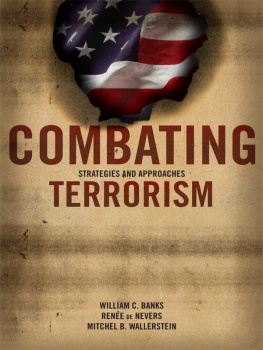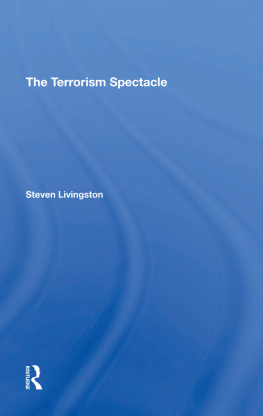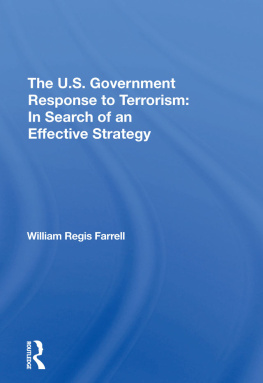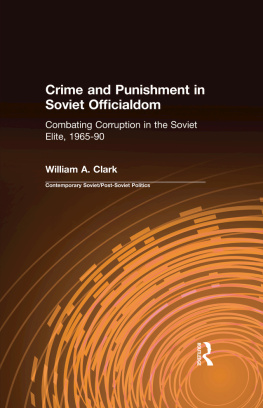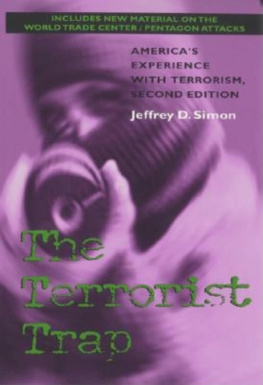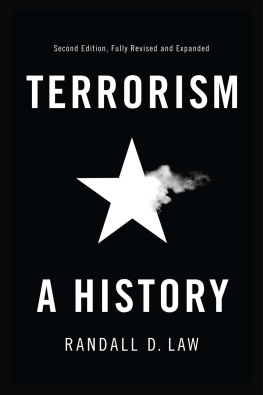Combating Terrorism
Combating Terrorism
Strategies and Approaches
William C. Banks
Syracuse University
Rene de Nevers
Syracuse University
Mitchel B. Wallerstein
Syracuse University
CQ Press
1255 22nd Street, NW, Suite 400
Washington, DC 20037
Phone: 202-729-1900; toll-free, 1-866-4CQ-PRESS (1-866-427-7737)
Web: www.cqpress.com
Copyright 2008 by CQ Press, a division of Congressional Quarterly Inc.
All rights reserved. No part of this publication may be reproduced or transmitted in any form or by any means, electronic or mechanical, including photocopy, recording, or any information storage and retrieval system, without permission in writing from the publisher.
Photo Credits: AP Images, 285
Cover design: El Jefe Design

The paper used in this publication exceeds the requirements of the American National Standard for Information SciencesPermanence of Paper for Printed Library Materials, ANSI Z39.48-1992.
Printed and bound in the United States of America
11 10 09 08 07 1 2 3 4 5
Library of Congress Cataloging-in-Publication Data
Banks, William C.
Combating terrorism: strategies and approaches / William C. Banks, Rene de Nevers, Mitchel B. Wallerstein.
p. cm.
Includes bibliographical references and index.
ISBN 978-0-87289-299-6 (alk. paper)
1. TerrorismUnited States. 2. TerrorismUnited StatesPrevention. 3. TerrorismGovernment policyUnited States. 4. TerroristsUnited States. 5. Civil defenseUnited States. I. De Nevers, Rene. II. Wallerstein, Mitchel B. III. Title.
HV6432.B355 2008
363.3251560973 dc22
2007035734
To our students
About the Authors
William C. Banks is professor of law and public administration, as well as director of the Institute for National Security and Counterterrorism, at Syracuse University. He is recognized internationally as an expert on constitutional and national security law and counterterrorism. He has written extensively on national security, domestic and international terrorism, and emergency preparedness and response. He coauthored the definitive text in the field, National Security Law, Fourth Edition, and in 2007, Banks and coauthors Stephen Dycus and Peter Raven-Hansen published Counterterrorism Law to help define this emerging field. He has also served as special counsel to the United States Senate Judiciary Committee and worked with the committee on the confirmation hearings for Supreme Court nominee Stephen G. Breyer.
Rene de Nevers is assistant professor of public administration at the Maxwell School of Citizenship and Public Affairs at Syracuse University, teaching courses in international and national security. She has taught at the University of Oklahoma and was a research fellow at the Kennedy Schools Belfer Center for Science and International Affairs; the Center for International Security and Cooperation and the Hoover Institution, both at Stanford University; and the International Institute for Strategic Studies. Her research interests include U.S. cooperation with multilateral institutions in combating terrorism, regulation of the private security industry, and the linkages between international norms and the use of force. She has written numerous articles on international security and is the author of Comrades No More: The Seeds of Change in Eastern Europe (2003).
Mitchel B. Wallerstein is dean of the Maxwell School of Citizenship and Public Affairs and professor of political science and public administration at Syracuse University. He has written numerous books, articles and studies on national security matters. Wallerstein previously was vice president of the John D. and Catherine T. MacArthur Foundation, where he directed the Program on Global Security and Sustainability. From 1993 to 1997, he served as deputy assistant secretary of defense for counterproliferation policy and as senior representative for trade security policy. During his tenure at the Department of Defense, he helped found and subsequently cochaired the Senior Defense Group on Proliferation at NATO. He has taught at M.I.T., George Washington University, Georgetown University, and the Johns Hopkins University School of Advanced International Studies. He is a member of the Council on Foreign Relations and the International Institute for Strategic Studies and recently was elected president of the Association of Professional Schools of International Affairs.
Brief Contents
Contents
Boxes, Tables, Figures, and Maps
Boxes
Tables
Figures
Maps
Preface
S ix years after the September 11, 2001, terrorist attacks, terrorism and what to do about it remain in the vortex of policy, political, and legal debates and analyses in the United States. And it is not likely that there will be a significant downturn in the importance attached to combating terrorism anytime soon. Ironically, since the swift and effective U.S. campaign to remove the Taliban and al Qaeda from Afghanistan, al Qaeda has reportedly regrouped along the Pakistan-Afghanistan border, terrorist cells have developed a lethal and effective franchise in Iraq, and the world has witnessed the emergence of homegrown terrorism in London and Madrid. Meanwhile, the U.S. government continues to maintain that additional terrorist strikes on one or more domestic targets are likely, and it has argued successfully that the prospect of more terrorism targeting Americans justifies intrusive new measures to conduct surveillance, without a court order, of the electronic communications of those suspected of ties to terrorism.
Combating Terrorism: Strategies and Approaches seeks to lay out in straightforward terms the challenges confronting U.S. decision makers today and for the foreseeable future as they attempt to anticipate and respond to terrorist threats. The aim of this book is to bring into focus the dominant set of policy problems posed by terrorism in the twenty-first century. Students will find the book particularly useful in helping them to understand what is admittedly a disturbing and complicated subject and in reaching their own conclusions about which responses are likely to be effective. The book concentrates primarily on terrorist activity aimed at the United States, whatever its source.
Combating Terrorism has been written for undergraduate and graduate students studying terrorism and national or international security. It seeks to provoke thought and to generate understanding about some of this eras most vexing problems. Although this book assumes basic knowledge of U.S. government institutions and processes, any upper-division student should be able to work effectively with the text. The book also should be readily understandable to the layperson who is seeking an approachable explanation and enhanced understanding of issues that appear virtually every day in the newspapers and on television.
The Approach and Organization of This Book
Before the mid-1990s, terrorism occupied little space in the curricula of higher education or even in the popular literature. Even though terrorism has been a facet of international relations and internal strife within nations throughout human history, any attention to incidences of terrorism was typically treated within a survey of international relations, a history or political science course focusing on ethnic or religious groups within a region or nation-state, a seminar on foreign relations, or a criminal law course. After the first attack on the World Trade Center in 1993 and the Oklahoma City bombing in 1995, terrorism gained some additional attention as an academic subject. After the attacks of September 11, 2001, and the launching of the global war on terrorism by the George W. Bush administration, the subject of terrorism became an overnight sensation; it has subsequently generated significant academic attention, both within traditional fields of study and as a new area. The newly emerging academic interest in terrorism is not likely to be short-lived. The growing disparity between the haves and have-nots, along with the demonstrated impact of asymmetric warfare waged by terrorists, signals that, like it or not, systematic and longer-term understanding of terrorism and the response to it will have to be part of higher education for many years to come.

 The paper used in this publication exceeds the requirements of the American National Standard for Information SciencesPermanence of Paper for Printed Library Materials, ANSI Z39.48-1992.
The paper used in this publication exceeds the requirements of the American National Standard for Information SciencesPermanence of Paper for Printed Library Materials, ANSI Z39.48-1992.
